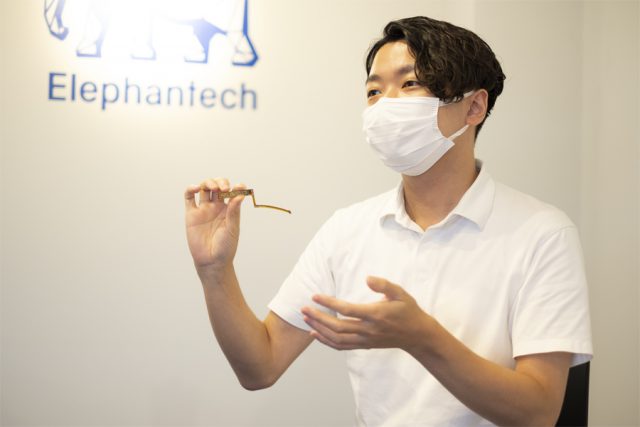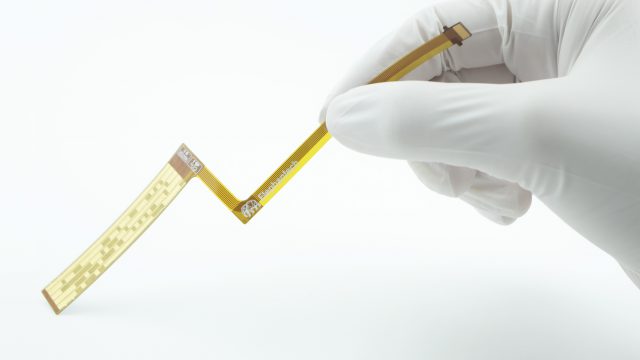Japanese / English

What is a new sample?
We have been providing samples to introduce P-Flex® to many people, but this sample is different from the previous ones as it targeted customers in the Camera Industry.
FPCs are used in many products, such as smartphones and automobiles. At the same time, a significant number of FPCs are also used in Cameras, mainly single-lens reflex and mirrorless Cameras. A high percentage of FPCs used in Cameras are single-sided FPCs, and many of them match the specifications of our FPCs. In that sense, we created this sample to attract interest in P-Flex®, especially among those involved in the Camera Industry.

Please tell us about the features of the sample.
The most significant feature is that this sample uses electrolytic gold plating.
Our FPCs have been processed with electroless plating on the exposed copper parts until now. What has changed significantly with adopting electrolytic gold plating is that the gold plating thickness is much thicker than that of electroless gold plating.
While electroless gold plating has a gold thickness of 0.03 μm or more, electrolytic gold plating has a thickness of 0.3 μm or more, ten times thicker than electrolytic gold plating.
In sliding areas where there is friction, if the gold plating is thin, it will quickly peel off to reveal the underlying copper pattern, but this problem can be avoided by thickening the gold plating. At the same time, exposure of the underlying nickel layer and copper foil can be reduced, and corrosion resistance can be improved.

Please tell us about the FPC sample inspired by the Camera Design.
For example, we used polyimide as the base material for the FPC. It is because polyimide is used widely in FPCs used in Camera products.
Our polyimide substrates are UL certified in 2021. Also, we can improve the quality of gas resistance required for consumer products by using electrolytic gold plating for surface treatment.
In the Camera Industry, all manufacturers require gas resistance. The Camera must function correctly even when shooting in harsh environments, such as near volcanoes or battlefields.
Please tell us about the level of interest in and response to companies’ low environmental impact of FPC P-Flex®.
We have received a very gratifying offer from a European manufacturer that wants to use our products because they are designed to reduce environmental impact. We are currently in the process of implementing various measures together with the manufacturer.
Elephantech was the first company in the world to mass-produce FPCs by printing to reduce environmental impact toward the realization of a sustainable society. Since we are the first company in the world to mass-produce FPCs using this Elephantech’s manufacturing method(Pure Additive™️ method), there are still many hurdles to overcome. And while there may be more hurdles to overcome in the future, we will do our best to clear them one by one.
We are convinced that environmental issues are unavoidable in realizing a sustainable society and that our FPC construction method, which recognizes low environmental impact, will be necessary for the future. We look forward to your continued support.
